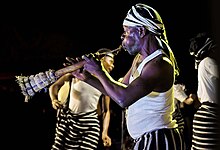Tiv (ethnic group)

The Tiv are an ethnic group in West Africa .
The majority of Tiv, with around 2,212,000 representatives, live in Nigeria , while a minority is based in the neighboring state of Cameroon . In Nigeria, where the predominantly Christian Tiv make up 3.5% of the total population, they are traditionally located in the states of Benue , Taraba and Nassarawa in the central east.
history
In the history of the Tiv there have been repeated ethnic conflicts and revolts, in which the traditional aversion of the Tiv to the centralized government dominated by foreign ethnic groups was expressed. Under British colonial administration, the conflicts escalated in 1934 and 1939; after independence they flared up again in 1964 and 2001.
Tiv uprising 1964
In 1964, there was an uprising by armed Tiv militias in which up to 4,000 people died and which could only be brought under control through the use of the Nigerian army . The predominantly Christian Tiv, who sympathized with the United Middle Belt Congress (UMBC) party, saw themselves at a disadvantage compared to the Hausa-Fulani Muslim population group , whom they viewed as invaders, and the ruling Northern People's Congress (NPC) party, which they dominated For them it was expressed, among other things, in an unjust tax collection.
Attacks on the property of NPC functionaries had already occurred in August and September 1960; some people died in these. After the murder of a clan chief on February 12, 1964 and after an annual meeting of the NPC, there were open confrontations with the police and NPC supporters. The Nigerian government sent troops to the Tiv area in November 1964. The troops put down the uprising in December and systematically disarmed the Tiv. They remained stationed there until June 1965. The government promised the Tiv more self-government.
Azara-Tiv conflict 2001
Another ethnic conflict escalated in June 2001 in Nassarawa state between the Tiv and the Muslim, Hausa- speaking Azara . The fighting broke out when the traditional leader of the Azara, Mussa Ibrahim, and his four companions were shot. The Tiv had accused Ibrahim of taking their land away from them. The Azara therefore suspected the Tiv of the attack and systematically pursued them. Tens of thousands of Tiv fled to the neighboring state of Benue, where several refugee camps were set up; some of the attacked Tiv fought back.
language
The language Tiv, also called Tiv, is one of the tivoid languages , which in turn belongs to the bantoid languages . Tiv has twelve nominal classes , which are marked by prefixes and suffixes, four of which are purely tonal. Tiv is, like most Bantu languages, a tonal language . Linguistic exploration of the Tiv began as early as 1854 when the Anglican Bishop Samuel Ajayi Crowther recorded a word list of the Tiv. In 1932 the first Tiv English dictionary appeared in Lagos . The Briton Roy Clive Abraham published a Tiv grammar in 1933, as well as a dictionary and a comprehensive study in four volumes in 1940. The Bible was translated in Tiv in the 1960s.
Society, art and music
See Charles Keil, Tiv Music: The Sociology of Art in a Classless Society . Chicago University Press, Chicago, Illinois, USA 1979, ISBN 0-226-42962-8 .
radio
- Karin Sommer: About witch owls in mango trees. A dangerous expedition to the Tiv people. Radio broadcast on May 10, 1997, Bayerischer Rundfunk
Web links
swell
- ↑ www.ethnologue.com, as of 1991
- ↑ Gustav Seeburg: The truth about Nigeria / Biafra. Prehistory and background of the conflict. Verlag Paul Haupt, Bern 1969, p. 87
- ^ Peter Körner: 184 Nigeria (Tiv uprising 1964). In: War Archives: Wars and Armed Conflicts since 1945. Working Group on Research into the Causes of War (AKUF), archived from the original on September 21, 2004 ; Retrieved April 12, 2007 .
- ^ Basler Zeitung : Thousands on the run in Nigeria. , June 25, 2001
- ^ Herrmann Jungraithmayr, Wilhelm JG Möhlig (ed.): Lexicon of African Studies. Reimer, Berlin 1983, p. 244
